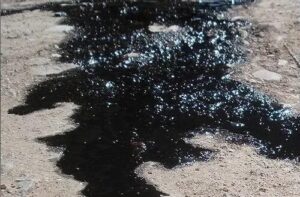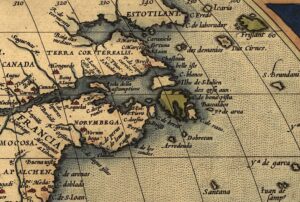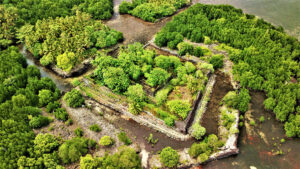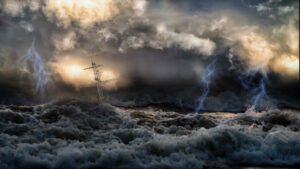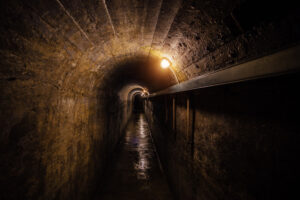In the 17th century, word spread of a pirate utopia on the far-flung coast of Madagascar. Pirates, ex-pirates, ex-slaves, or anyone running from the authorities settled in this haven, which ran on an egalitarian, democratic system. Yes, a democratic pirate colony. They called it Libertatia.
Background
A book titled A General History of Robberies and Murders of the Most Notorious Pyrates came out in 1724. In it, author Captain Charles Johnson described the adventures of one Captain James Misson.
Misson came from a well-to-do family in Provence, France. Instead of indulging in his family’s fortune, he took up a seafaring life. He met a priest named Cacaccioli who had rather radical ideas for the time. Both men blamed monarchs, organized religion, and the elite for the suffering and oppression of others. They believed in justice, equality, and the fair distribution of wealth to all.
The pair set off with a large group of men to a natural harbor in northern Madagascar and established a colony. They created their own constitution, nationality, democratic government, language, national motto, and flag. Their motto was, “For God and Liberty!” Their flag was white.
They built a town with fortifications. The area abounded in rich, fertile soil and fresh water. Pirates worked the land “where they might enjoy the fruits of their labor and go to their graves in peace”.

Pirate captain with his spyglass. Photo: Shutterstock
However, the defining feature of the colony was its governmental system. Pirates and runaways from England, France, the Netherlands, and Africa came to the colony and submitted their assets to a communal treasury. Some booty came from slave or raided merchant ships. A council kept the peace, enacted laws, and ensured that no one hoarded wealth. An elected position on the council lasted a term of three years.
Unfortunately, this egalitarian paradise endured only 25 years. Natives attacked the colony, resulting in Caraccioli’s death. Misson managed to escape but perished in a storm. This seems a rather anticlimactic end to the story.
Theories
Historians remain unsure if the colony actually existed. Madagascar and its nearby islands did house pirate communities around this time. It was a valuable access point to the Indian Ocean and the Red Sea, where many vessels traveled. Records show that notorious figures like Captain Kidd and Henry Every made possible visits to or set up bases on Madagascar.
But the only remaining evidence of Libertatia is oral history. Contemporary English journalist Kevin Rushby traveled to northern Madagascar, Mozambique, the Comoros, and the Quirimbas Islands to collect information about the colony. He met supposed descendants and visited a house in which some of the pirates may have resided. These details remain unconfirmed.

Daniel Defoe, author of Robinson Crusoe. Photo: National Maritime Museum of London
Libertatia’s location has several candidates: the northern Madagascan port city of Antsiranana (formerly Diego Suarez), which housed pirate communities in the 1600s, Fort Dauphin in the southeast, Nosy Boraha (formerly Sainte-Marie) and Ranter Bay, a colony which pirate James Plantain set up.
However, the main question is, where does this story come from? Captain Charles Johnson, the author of the pirate biography, does not show up in any ship’s log or census. This led many to assume that it was a pseudonym. A pseudonym for whom? The most popular theory is that the real author was Daniel Defoe, author of Robinson Crusoe.
Daniel Defoe’s Utopia?
Defoe had his run-ins with the law over his satire and opinionated views on religion, monarchic corruption, and personal liberty. These views threatened the reputation and integrity of the Crown. He served time in jail for his beliefs, forcing him to publish many of his writings under pseudonyms.
Researchers believe that Captain Charles Johnson’s tone, style, and ideas reflect those of Defoe, who also had an interest in pirates and adventure. Both Robinson Crusoe and another work, The Life, Adventures and Piracies of the Famous Captain Singleton, make him a viable candidate for the story’s author.
However, some believe that the answer is obvious. A playwright, Charles Johnson, put out a play called The Successful Pyrate in 1712. But most enthusiasts do not support the theory that Captain Charles Johnson and playwright Charles Johnson are one and the same person. Perhaps they find that solution too easy.
On the other side of the world, in Nassau, Bahamas, there was a base of pirate operations called the Republic of Pirates. It was short-lived, lasting from 1706 to 1718. While it did not have as structured a system as Libertatia, it did rule itself democratically. It voted for their leadership and treated those on the bottom tiers of society as equals.
From this base, pirates managed to terrorize the other West Indian territories. This all came to an abrupt halt around 1717 and 1718, with the Bahamas’ first governor, former captain Woodes Rogers. He promoted the King’s Pardon, an official pardon from King George I for those who gave up piracy for good. This Republic of Pirates and Libertatia have several similarities. It is possible that the writer used the Bahamas colony as inspiration for his utopian pirate dream.
The takeaway
The highly idealized and sometimes contradictory nature of Libertatia suggests that it was a fabrication or allegory rather than an actual place. The story first circulated around the beginnings of the Enlightenment, when ideas of liberty, equality, and the like began to skyrocket in France and America. People became disillusioned with the archaism and tyranny of the monarchies. If Defoe created the story, he used Libertatia as a symbol or simulation of his ideal socialist society, where monarchies did not exist and the people ruled.

Antsiranana, Madagascar: one of the possible locations of Libertatia. Photo: Damian Ryszawy/Shutterstock
Despite pirates’ reputation as scum, greedy, and dangerous, Defoe tended to favor their freedom, unapologetic conviction, and dismissal of authority. Maybe he envisioned Libertatia as an alternative lifestyle for those who wanted the changes that he himself desired.
Various forms of media explored the idea of a pirate colony. The Uncharted game franchise and the Pirates of the Caribbean films found it a great plot device for audiences to sympathize with pirates…or want to join them.


